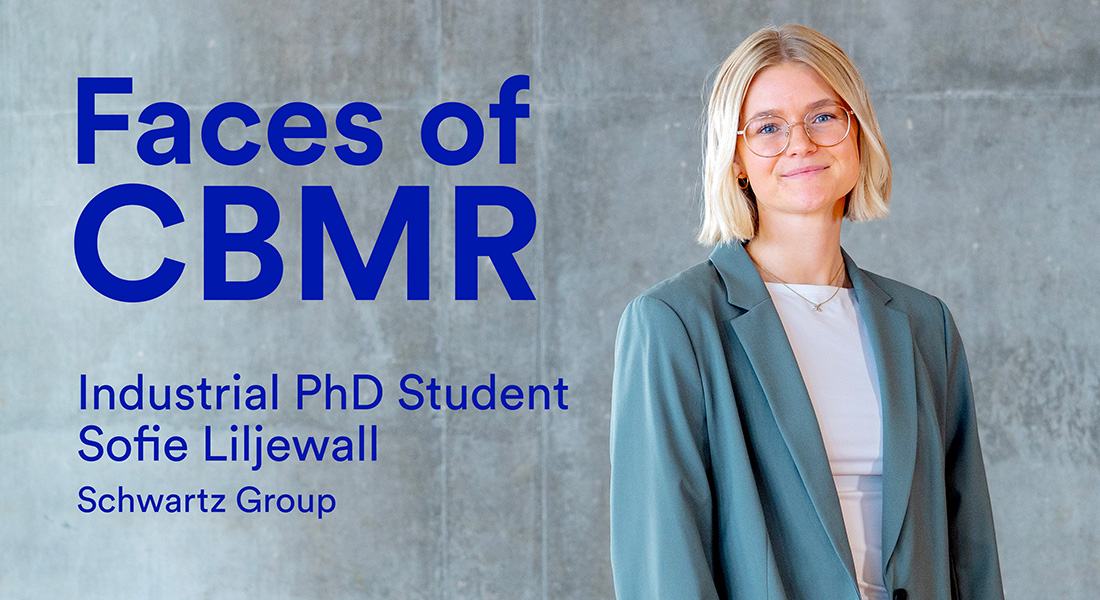“Working in a small company where I get insights into everything is fantastic”
Sofie Liljewall is an industrial PhD Student at SOLID Therapeutics and CBMR. Sofie has a Master’s degree in molecular biotechnology engineering and did her Master's thesis in the Schwartz Group at CBMR. She is currently working with novel cancer treatment at SOLID Therapeutics, investigating the role of the HCAR1 receptor in cancer cells.

How did your interest in science start?
I’m very curious, and I was always interested in how the human body works and how everything is connected. My mom is a nurse, and my dad always said I should be an engineer. On top of that, I had some great teachers at school, so I’ve had many people inspire me.
What did you study at university and why?
I studied molecular biotechnology engineering at Lund Technical University in Sweden. I decided to study this partly because it aligned with my interests and because engineering held a lot of opportunities. Lastly, the fact that Lund Technical University is famous for having a rich student life was very appealing to me.
You were engaged in several student activities and worked besides your studies. Why was this important for you?
For me, there is a right level of stress where I work best. Having a lot to juggle besides my studies, like my job in a pharmaceutical company and my student activities, made me able to focus harder on my studies when I had the time. I had a lot of responsibilities, such as people working directly under me and working with huge budgets. These things have had a huge impact on my life because they honed not just my work skills, but also developed me as a person.
How did you end up at CBMR?
I signed up for a mentorship programme in engineering, and my mentor was retired, but he had many connections. In the last half year of my studies, I had my Master’s thesis, and I really wanted to go to Copenhagen, so my mentor connected me with CBMR. At first, they seemed a little sceptical of an engineering student interested in basic metabolic research, but they ended up finding a project that fit me.
What was your Master’s thesis about?
I worked alongside a PhD student looking into G protein coupled receptor signalling. He worked on many other projects, so he assigned one small part of one of the projects to me. I investigated the signalling properties of the GPR91/SUCNR1 receptor. We wanted to create an overview of how both the human and the murine SUCNR1 receptor recruit G proteins within the respective G protein sub-families and at what potency. And we did actually find some differences between the human and the murine receptors.
What is your current connection to CBMR?
I’m doing an industrial PhD, which means that you have a university affiliation and then you do the research with a company you’re employed at. So, for me, the university affiliation is CBMR, and my research is at SOLID Therapeutics, a spin-off company of CBMR developing novel cancer treatment.
How did you become an industrial PhD student at SOLID Therapeutics – and what are you working on?
I became employed as a research assistant at CBMR and was introduced to research involving the lactate receptor, also called HCAR1/GPR81, which is also part of SOLID Therapeutics’ research. SOLID needed someone for similar lab work, so I was hired as a research assistant for SOLID, which we then decided to combine with an industrial PhD because I was still interested in doing a PhD. At SOLID, I work on understanding the role of the HCAR1 receptor in cancer. This receptor is involved in several pro-tumorigenic pathways, such as suppressing the immune cells and potentiating cancer cell proliferation, among other things, so we are looking into antagonising the receptor to stop the cancer cells from growing. Later on, another objective of my PhD will be investigating potential combination treatments.
You are also helping with communications at SOLID Therapeutics. How did that happen?
It started with SOLID needing a new logo and web page, and I offered to give it a go, as I’ve always enjoyed making things look aesthetically pleasing. It was not hardcore coding, but I had fun setting them up. Then, since I was the youngest in the team and the one with the most practical experience with social media, I gradually began managing that side of the company. And I really love it, it’s nice to break up the research with something more creative now and then.
Where do you hope to see your career going in the future?
I think I will end up in pharma research in the industry. Since my university years, I’ve had a taste for working with leadership, so I could easily see myself in a leadership position someday. However, I hope that SOLID takes off and we can keep working for a couple of years. Right now, I enjoy being part of both industry and academia because you get the best of both worlds. And working in a small company where I get insights into almost everything is fantastic.
This interview was edited for clarity and concision.
